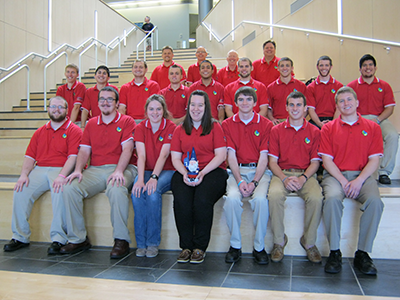Sixteen students from USI's business and engineering disciplines came together to develop product ideas and prototypes in the second annual Technology Commercialization Academy, a partnership between USI and Crane Naval Surface Warfare Center.
 |
|
Front row: Logan Schmitt, Adam Buddemeyer, Michelle Muse, Rachel Isaacson, Zack Mathis, Austin Viano, Ryan Hicks |
Students and faculty leaders spent a day touring Crane's facilities and attending a presentation by Crane officials that introduced them to several military patents. Upon returning to the classroom, students began a unique ideation process, developed and led by Romain College of Business faculty members Dr. Kevin Celuch, Blair Chair of Business Science and Professor of Marketing, and Mr. Bryan Bourdeau, Instructor in Business.
Celuch and Bourdeau designed the new ideation/innovation process for an entrepreneurship minor, which combines elements of structured and unstructured problem solving as a mechanism for developing ideas, performing feasibility testing, and building business models. They have successfully applied their methodology not only in the classroom, but in various community projects as well.
Immersed in ideating, teams generated a wide variety of quality ideas to incorporate the technology from a radio intelligence patent into practical applications. Students enjoy the innovation process as well as working with and learning from students in other academic disciplines. Senior John Sawa said, "As an engineering student, I hadn't been exposed to any of the business aspects of commercializing a product or service. It really surprised me the amount of feasibility and market analysis that must be conducted before taking the next step in the entrepreneurship process and digging into the financials."
The first phase of the academy culminated in two events: a presentation at Crane and one held in the Business and Engineering Center Atrium where the four teams presented their ideas to USI faculty, administrators, students, local media, investors, and community leaders, followed by a question and answer session.
The final product pitches were:
Participant response to the academy is overwhelmingly positive. Ryan Hicks, an MBA student and graduate assistant, said the TCA has been an exciting experience. "Ideating about new technologies with other students and then taking the next step is a great way to gain entrepreneurial experience that will be useful in a wide range of careers and is hard to come by elsewhere."
"I have acquired a great deal of experience and skills that will benefit me later in my professional career," said Sawa. "Coming into the TCA, I really didn't know what to expect, but I have gotten more out of it than I could have ever imagined. The TCA is one of the best opportunities that USI has to offer!"
Growth Alliance for Greater Evansville (GAGE) in collaboration with USI came up with the Academy idea in their Tech Transfer Committee. The academy was made possible through a Lilly Endowment Sustaining Grant secured by Dr. Mohammed Khayum, dean of the Romain College of Business, and Dr. Scott Gordon, dean of the Pott College of Science, Engineering, and Education.